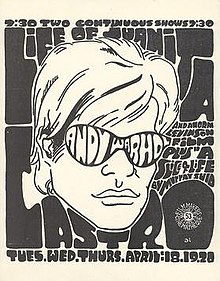| The Life of Juanita Castro | |
|---|---|
 Movie poster | |
| Directed by | Andy Warhol |
| Written by | Ronald Tavel |
| Starring | Marie Menken Ultra Violet Mercedes Ospina Ronald Tavel |
| Distributed by | Andy Warhol Films |
Release date |
|
Running time | 66 minutes |
| Country | United States |
| Language | English |
The Life of Juanita Castro is a 1965 American underground film directed by Andy Warhol, filmed in March 1965 based on the absurdist theater play by Ronald Tavel by the same name.